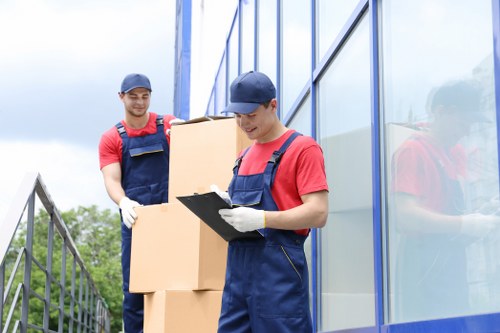Waste Disposal Guildford

Effective waste disposal in Guildford is essential for maintaining a clean and healthy environment. With the growing population and increasing economic activities, managing waste efficiently has become more critical than ever. Proper waste disposal not only helps in maintaining public health but also plays a significant role in conserving natural resources and protecting the ecosystem.
Guildford, known for its picturesque landscapes and vibrant community, faces unique challenges when it comes to waste management. The town’s layout, combined with its diverse residential and commercial areas, requires a comprehensive approach to waste disposal. This ensures that waste is managed sustainably, minimizing its impact on the environment.
Understanding the different types of waste is the first step towards effective disposal. Waste can generally be categorized into municipal solid waste, hazardous waste, and recyclable materials. Each category requires specific handling and disposal methods to ensure safety and compliance with environmental regulations.
Importance of Waste Disposal

Waste disposal plays a pivotal role in public health. Improper waste management can lead to the spread of diseases, contamination of water sources, and degradation of air quality. By disposing of waste correctly, Guildford can prevent these adverse effects, ensuring a healthier environment for its residents.
Moreover, effective waste disposal contributes to the conservation of natural resources. Recycling and reusing materials reduce the need for raw materials, thereby saving energy and preserving natural habitats. This sustainable approach is vital for long-term environmental stewardship.
Economic benefits also arise from proper waste management. It creates job opportunities in the recycling and waste processing industries and can reduce the costs associated with waste disposal. Additionally, a clean environment enhances the town’s appeal, potentially attracting more businesses and tourism.
Services Offered in Guildford

Residential Waste Collection
Guildford offers comprehensive residential waste collection services to ensure that households can dispose of their waste conveniently and responsibly. Regular collection schedules are maintained to prevent waste accumulation, and residents are encouraged to separate recyclable materials from general waste.
Commercial Waste Solutions
Businesses in Guildford have access to specialized waste disposal services tailored to their specific needs. This includes bulk waste collection, hazardous waste management, and recycling services. These solutions help businesses comply with environmental regulations while minimizing their ecological footprint.
Recycling Programs
Guildford has established robust recycling programs to promote the reuse of materials. These programs focus on collecting paper, plastics, glass, and metals, ensuring that these materials are processed and reused effectively. Public awareness campaigns are conducted to educate residents about the importance of recycling.
Local Regulations and Compliance

Guildford adheres to stringent local regulations governing waste disposal to ensure environmental protection and public safety. These regulations outline the proper methods for waste segregation, collection, and disposal. Compliance is enforced through regular inspections and penalties for violations.
Businesses involved in waste disposal must obtain the necessary permits and follow industry best practices. This ensures that hazardous and non-hazardous wastes are managed appropriately, reducing the risk of environmental contamination.
Residents are also required to follow guidelines for waste disposal, including sorting recyclables and disposing of hazardous household waste at designated facilities. Education and outreach programs are in place to help the community understand and comply with these regulations.
Advanced Waste Management Techniques

Guildford employs advanced waste management techniques to enhance the efficiency and effectiveness of waste disposal. Technologies such as waste-to-energy plants convert waste into electricity, reducing the reliance on landfills and generating renewable energy.
Another innovative approach is the implementation of anaerobic digestion, which breaks down organic waste to produce biogas. This biogas can be used as a clean energy source, contributing to the town’s sustainability goals.
Composting is also promoted for organic waste, turning kitchen and garden waste into valuable compost for agriculture and gardening. These techniques not only manage waste sustainably but also create valuable by-products that benefit the community.
Challenges in Waste Disposal
Despite the efforts to manage waste effectively, Guildford faces several challenges in waste disposal. One of the primary challenges is the increasing volume of waste due to population growth and economic expansion. This puts additional strain on existing waste management infrastructure.
Another significant challenge is the public’s participation in waste segregation and recycling programs. Ensuring that residents properly sort their waste requires continuous education and motivation. Additionally, the disposal of hazardous waste poses risks that need careful handling to prevent environmental contamination.
Funding and resources also present challenges. Maintaining and upgrading waste management facilities require substantial investment, which can be a constraint for local authorities. Balancing the budget while providing high-quality waste disposal services is an ongoing issue.
Innovative Solutions for Waste Disposal
To address the challenges, Guildford is exploring innovative solutions in waste disposal. Collaborations with technology companies are paving the way for smart waste management systems that use data analytics and IoT devices to optimize waste collection routes and schedules.
Implementing community-based recycling initiatives encourages local participation and fosters a sense of responsibility among residents. These initiatives include neighborhood clean-up events, recycling drives, and educational workshops.
Additionally, promoting the circular economy model helps in reducing waste generation by encouraging the reuse and refurbishment of products. This approach not only minimizes waste but also stimulates economic growth by creating new business opportunities in the recycling and manufacturing sectors.
Environmental Impact of Waste Disposal
The environmental impact of waste disposal is a critical concern for Guildford. Landfills, if not managed properly, can lead to soil and water contamination through leachate and methane emissions. These pollutants can have detrimental effects on local ecosystems and contribute to greenhouse gas emissions.
By adopting sustainable waste disposal practices, Guildford can mitigate these environmental impacts. Recycling and composting reduce the volume of waste sent to landfills, while waste-to-energy technologies lower methane emissions and generate renewable energy.
Protecting natural habitats and conserving biodiversity are also part of Guildford’s waste management strategy. Proper disposal of waste ensures that local wildlife and plant species are not adversely affected by pollution and habitat destruction.
Community Involvement and Education
Community involvement is essential for the success of waste disposal programs in Guildford. Residents play a crucial role in keeping the town clean by adhering to waste segregation guidelines and participating in recycling programs.
Educational campaigns are conducted to raise awareness about the importance of responsible waste disposal and the benefits of recycling. Schools, community centers, and local organizations are engaged in spreading the message and encouraging active participation.
Volunteer programs and community clean-up events foster a sense of ownership and pride among residents, motivating them to maintain a clean and sustainable environment. These collective efforts contribute significantly to the effectiveness of waste disposal initiatives.
Future of Waste Disposal in Guildford
The future of waste disposal in Guildford looks promising with ongoing advancements in technology and sustainable practices. Emphasizing the reduction of waste generation, enhancing recycling rates, and adopting renewable energy solutions are key focus areas.
Investment in research and development will drive the adoption of new waste management technologies, making disposal more efficient and environmentally friendly. Collaborations with environmental organizations and government agencies will support these initiatives.
Long-term sustainability goals include achieving zero waste, where all waste is either recycled, composted, or converted into energy. This ambitious target requires concerted efforts from all stakeholders, including the community, businesses, and local authorities.
10-15 Nearby Areas to Guildford
- Virginia Water – Just a few miles from Guildford, Virginia Water is known for its beautiful lake and affluent residential areas, benefiting from efficient waste disposal services.
- Shalford – A neighboring village with a strong community focus on recycling and sustainable waste management practices.
- Bisley – Close to Guildford, Bisley has access to the town’s commercial waste solutions, supporting local businesses in responsible waste disposal.
- Woking – Located nearby, Woking collaborates with Guildford on regional waste disposal initiatives, enhancing overall efficiency.
- Shere – A picturesque village that benefits from Guildford’s residential waste collection services, ensuring a clean environment.
- Merrow – Adjacent to Guildford, Merrow utilizes advanced waste management techniques implemented by Guildford’s services.
- Ripley – With its growing residential areas, Ripley relies on Guildford for reliable waste disposal and recycling programs.
- West End – This area integrates seamlessly with Guildford’s waste collection schedules, maintaining cleanliness and order.
- Poukai – A smaller community that benefits from Guildford’s educational campaigns on waste disposal and recycling.
- Alexander Hill – Close to the town center, Alexander Hill ensures efficient waste management through Guildford’s commercial solutions.
- Send – Partnering with Guildford, Send enhances its waste disposal practices through shared resources and expertise.
- Chipstead – A nearby village that participates in Guildford’s community-based recycling initiatives.
- Godalming – While slightly farther, Godalming collaborates with Guildford on regional waste management strategies.
- Stoke d'Abernon – Utilizes Guildford’s advanced waste management techniques to maintain a sustainable environment.
- Ockham – Benefits from Guildford’s innovative waste disposal solutions, ensuring minimal environmental impact.
FAQs
1. How often is waste collected in Guildford?
Waste collection schedules in Guildford vary depending on the area and type of waste. Residential waste is typically collected weekly, while recycling and bulk waste collection may occur bi-weekly or monthly.
2. What materials can be recycled in Guildford?
Guildford’s recycling program accepts materials such as paper, cardboard, plastics, glass, and metals. It is important to clean and sort recyclables according to the guidelines provided by the local waste management authority.
3. How can businesses in Guildford manage hazardous waste?
Businesses handling hazardous waste in Guildford must follow strict disposal procedures. They are required to obtain the necessary permits and collaborate with certified waste disposal companies to ensure safe and compliant handling of hazardous materials.
4. Are there any initiatives to reduce waste in Guildford?
Yes, Guildford has several initiatives aimed at reducing waste generation. These include public awareness campaigns, community recycling programs, and the promotion of the circular economy model to encourage reuse and refurbishment of products.
5. Where can I dispose of large items in Guildford?
Large items, such as furniture and appliances, can be disposed of through Guildford’s bulk waste collection service. Residents can schedule a pick-up by contacting the local waste management provider or utilize designated drop-off points for large items.